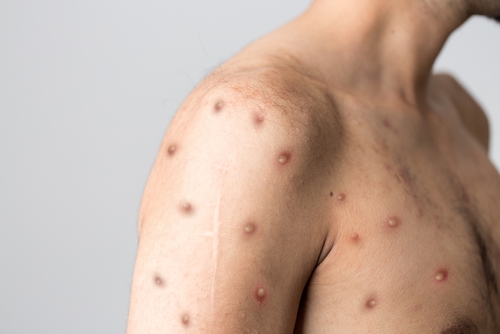
Together, the Democratic Republic of the Congo (DRC) National Institute for Biomedical Research (INRB) and the United States National Institute of Allergy and Infectious Diseases (NIAID) are co-leading an evaluation trial of TPOXX, an antiviral drug for monkeypox.
With this year’s worldwide outbreak of monkeypox highlighting the importance of countermeasures, the pair will evaluate the drug’s safety and ability to counteract monkeypox symptoms and outcomes. TPOXX works by targeting a protein found in both the virus that causes smallpox and the monkeypox virus, keeping that virus from spreading by blocking its particles from exiting human cells and replicating. Made by SIGA Technologies, Inc., the drug has already earned approval from the U.S. Food and Drug Administration as a smallpox treatment.
“Monkeypox has caused a high burden of disease and death in children and adults in the Democratic Republic of the Congo, and improved treatment options are urgently needed,” NIAID Director Anthony Fauci, M.D., said. “This clinical trial will yield critical information about the safety and efficacy of tecovirimat for monkeypox. I want to thank our DRC scientific partners as well as the Congolese people for their continued collaboration in advancing this important clinical research.”
The new trial will also include collaborators such as the U.S. Centers for Disease Control and Prevention (CDC), Institute of Tropical Medicine Antwerp, Alliance for International Medical Action (ALIMA), and the World Health Organization (WHO).
Up to 450 adults and children with lab-confirmed monkeypox infections – and who weigh at least 3 kilograms, or approximately 6.6 pounds – will be enrolled. Randomized and double-blinded, neither participants nor investigators will know who among the volunteers has been given TPOXX or placebo capsules. Either way, dosages will be given twice daily for 14 days.
Until this year, monkeypox has been endemic to certain areas of Africa. However, until this year, it was a rare occurrence for most of the world. Largely, it spreads through contact with infected animals. Still, humans can also transmit the virus through sex or other direct contact, as well as indirect contact with contaminated clothing or bedding. A multi-continent outbreak in May sparked public health emergency declarations from WHO and the U.S. Department of Health and Human Services. While 68,900 people have been confirmed infected over the year, only 25 ultimately died of the outbreak.
Participants in the new trial will be followed for at least 28 days after they have been discharged. During treatment, investigators will focus on the average time to heal skin lesions among those receiving TPOXX compared to those given a placebo, as well as how quickly participants test negative for monkeypox virus in the blood, the overall severity and duration of the disease, and the difference in mortality between various groups.




